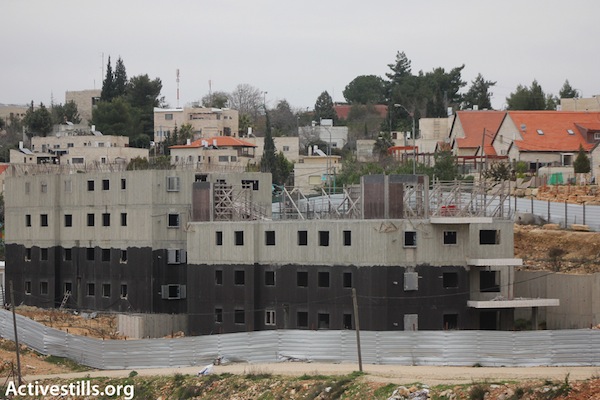Israel approves 90 new settlement homes in Beit El to reward evacuees from the evacuated settlement neighborhood of Givat Ha’Ulpana. The problem? The homes are to be built on lands confiscated for security purposes, a practice the High Court ruled against decades ago.
By Yesh Din, written by Yossi Gurvitz

One of ancient Greece’s sages, legend says, mocked the Athenian lawgiver Solon for writing his constitution and laws. He told Solon laws were like fishing net: It stops the weak fish, but the larger, stronger ones will simply tear it to bits.
Ynet reported earlier this week that the government intends to reward the evacuees from the illegal settlement of Givat Ha’Ulpana for their blatant violation of the law by building them 90 new apartments in the settlement of Beit El. Unfortunately, no lands are available in Beit El for such purposes.
The only land available in Beit El is land that was confiscated by the army in the 1970s, and it can only be used for military purposes. There was a short period in which the army and the settlers worked hand in hand in arguing that the settlements are a “security necessity,” but those halcyon days were over after the HCJ decision of Elon Moreh. Since then, the government and the settlers had to find new and innovative ways of stealing land, the most prominent of which is designating Palestinian land as “state land”, and then, strangely enough, giving it away to people residing in another country. But that’s a whole new story.
So now the government says that it intends to build houses for individual settlers on land that was confiscated solely for security reasons. One may, of course, see it as yet another way for the government to stick its thumb into Obama’s eyes, seeing as this declaration comes a month before the president’s visit, but that’s barely the tip of the iceberg.
For starters, the next time the government confiscates land or a structure on grounds that it is essential for “security” purposes, we should doubt it. The purpose of the confiscation may well be transferring the land from private Palestinian hands to private Jewish hands without the hassle of having to pay for it. After all, if there was a true security need in confiscating the Beit El lands, then there are two possible outcomes. Either the government would avoid using them to house civilians (who can imagine using civilians as human shields to protect a military facility?), or, assuming there is no longer any military purpose for those lands, they would revert back to their owners, along with some compensation. Since neither happened, we can safely assume there was never any real military need for the confiscation of these lands.
Secondly, the state is, with a high degree of certainty, about to lose in court. There will almost certainly be an appeal to the HCJ, which has already ruled on the issue. So either the government thinks it can convince the HCJ to rewrite a 35 years old decision (and thereby remove whatever remains of legal protection Palestinians still enjoy), or it intends to ignore the ruling altogether.
The government is playing a double game. If the HCJ does not intervene, thereby rendering its earlier decisions void, the government will proclaim victory. If the court does intervene, the government will turn around and tell the settlers that “we tried, but the evil judges wouldn’t let us. We need more power in order to pack the court.” Basically a win-win.
Of course, this concept is false. The only reason the HCJ even deals with petitions related to the occupation is because of a 45-years old decision by Meir Shamgar, the former attorney-general. This is not a government decision, much less a Knesset decision; this is a decision by a bureaucrat which is simply beneficial to the government. Had the government truly wanted to change the situation, it would just have to legislate a simple law: “The HCJ shall not deal with petitions of foreign residents who do not have either residency or citizen status within the State of Israel.” And that would end HCJ’s oversight over the occupation. Given the minuscule number of times the court actually does anything, it’s doubtful whether anyone but the lawyers would notice.
Yet the government doesn’t do it. Why? It would have no problems getting the votes. Why? Because the current situation, in which the HCJ pretends to provide oversight but doesn’t is ideal as far as the government is concerned. Officially, there is judicial oversight, so everything it does is hanky-dory. In practice, this oversight barely exists. The court approves just about everything, from land confiscation under dubious pretenses to the expulsion of 400 suspects without trial, and is notorious for admitting secret evidence. The judges often agonize over their decisions – but, with hardly any exception, once their ordeal is over, they approve whatever the government wants. Without the HCJ, which provides the occupation with its Kosher stamp, it may well have collapsed earlier.
And if the HCJ does deny, for the time being, the building of the new apartments in Beit El, it will save the government – not for the first time – from the consequences of its own actions. This will not make the government view the court favorably; it will continue to wave it abroad as reason to leave Israel alone, while at the same time attacking it at home.
Written by Yossi Gurvitz in his capacity as a blogger for Yesh Din, Volunteers for Human Rights. A version of this post was first published on Yesh Din’s blog.
